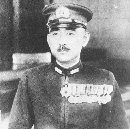martxyz
Posts: 194
Joined: 1/29/2005
From: Broughton, Northants, UK
Status: offline

|
quote:
ORIGINAL: 06 Maestro
Hey Mart
I doubt anyone here is anti Brit. It is just that certain individuals (possibly European-maybe Iranian )have made such outlandish statements here that responses have been slightly embittered, which to me is quite understandable.
Speaking of Brits, one of my favorite British commanders was Lord Mountbatten-a very successful and charismatic leader. Before he passed on (about 30 years ago IIRC) he ordered/requested that no Japanese be present at his funeral. Do you think that this made that great man a morally depraved racist, and the government of the UK racist in honoring his desire regarding Japanese? He had first hand knowledge of Japanese atrocities against his men. If you are a leader, and an honorable man, those atrocities will not be forgotten-nor forgiven.
From a long term disgust of Imperial Japan, and a respect for his own men, he made it clear he wanted no Japanese at his funeral.
BTW, If Lord Mountbatten was involved in this current discussion today, I have little doubt as to which group he would aligned with.
Hiya
Lord Mountbatten was a man about whom people had very mixed views. Some of the American commanders (especially Admiral King if I recall) had no time for him, and some British historian's take a similar view. Personally, I don't know, but I do feel that he did get a lot of the praise that should rightly have gone to the great General Slim. As a man, Mountbatten was a complex, and not always what he seemed. Maybe I can answer your question in a different way, which gives two viewpoints at the same time.
When I was between 10 and 16, I lived in North Queensland. In 1966 a Japanese tuna boat sank off the coast, in flames, and one crew member died. My father was a chaplain to The Missions to Seamen (and had incidentally served towards the end of the war as a Fleet Air arm Observer in Avengers flying from the British Pacific Fleet). Anyway, we ended up, in our normal-sized house, with around 20-25 Japanese seamen sleeping on our lounge floor for about a month! They were gradually repatriated, so by the end of the month, only the Captain, the 1st Mate and his brother (who had severe learning difficulties but was part of the ships "family") remained. Prior to this, many of the seamen, before they got to know us, would apologize for the war, though they were too young, mostly, to have participated. They were all really nice guys.
Anyway, these last three were repatriated via Sydney, and we put them on the train at Townsville. Bear in mind that by then, they were good friends, one was mentally ill, and they were all good people. As we walked down the train aisle, a man with too much drink in him became EXTREMELY abusive, loud and threatening. He was swearing at them and I found it quite frightening. I was also outraged and confused by the treatment of these three friends, who had already suffered terribly, and were still in shock.
Later, my dad explained to me that he'd made inquiries and discovered that the angry man, full of hatred, and a bit too much alcohol, had been a POW of the Japanese, and the awful experience had lived with him for 20 years.
Do I feel able to criticize him? - most definitely not! At the same time, I knew the Japanese seamen, who were nice people. The ship was rebuilt, and two years later came back to the area, and detoured especially to dock at Townsville to thank the people that had helped them when they were in such need. They were still the generous people I remembered, and I am sure the man on the train was still full of hatred, for which I still wouldn't feel fit to criticize him, one little bit.
I am aware of the savagery of the war on the Pacific rim from the mid 1930's until 1945. I wouldn't seek to judge allied soldiers who committed what you might call "heat of the moment" personal atrocities (though I think commanders could have acted to rein those in more). I think the issue is a very complicated one. I feel that the biggest mistake is to extrapolate from what individuals may have done from fear, and personally-acquired hatred, to the more general question of atrocities committed by forces of all persuasions in the pacific,and elsewhere in the war. It wasn't a great moment in human history. To paint a broad brush to the extent of racist or ethnic slurs of Japanese, Caucasians, Russians and so on is though, in my view, completely unacceptable.
It's a long answer. I don't know what was in Mountbatten's heart and his decision was a personal one. He is, to me, the same as the man on the train, and I can't judge him. My only criticism of Mountbatten is based on the fact that I am a republican and don't think that he should have been a Lord in the first place, or given responsibilities for which he may not have had the experience or ability. Recently we have had many documentaries on the BBC about the anniversary of Indian independence, and of the terrible traumas that came with partition, and Mountbatten did not come out of it at all well, with many people taking the view that had he not interfered in the partition process so badly, many thousands of Indian and Pakistani lives may have been saved. They held him responsible for the deaths of many people, and also for much of the animosity that exists between India and Pakistan to this very day. I suspect that is far too simplistic, but Mountbatten was no saint. He was entitled to say who could attend his funeral though. I can think of loads of people I wouldn't want at mine. I just hate it when people turn up to gloat!
< Message edited by Mart -- 11/29/2007 10:45:36 PM >
|
 Printable Version
Printable Version


















 New Messages
New Messages No New Messages
No New Messages Hot Topic w/ New Messages
Hot Topic w/ New Messages Hot Topic w/o New Messages
Hot Topic w/o New Messages Locked w/ New Messages
Locked w/ New Messages Locked w/o New Messages
Locked w/o New Messages Post New Thread
Post New Thread